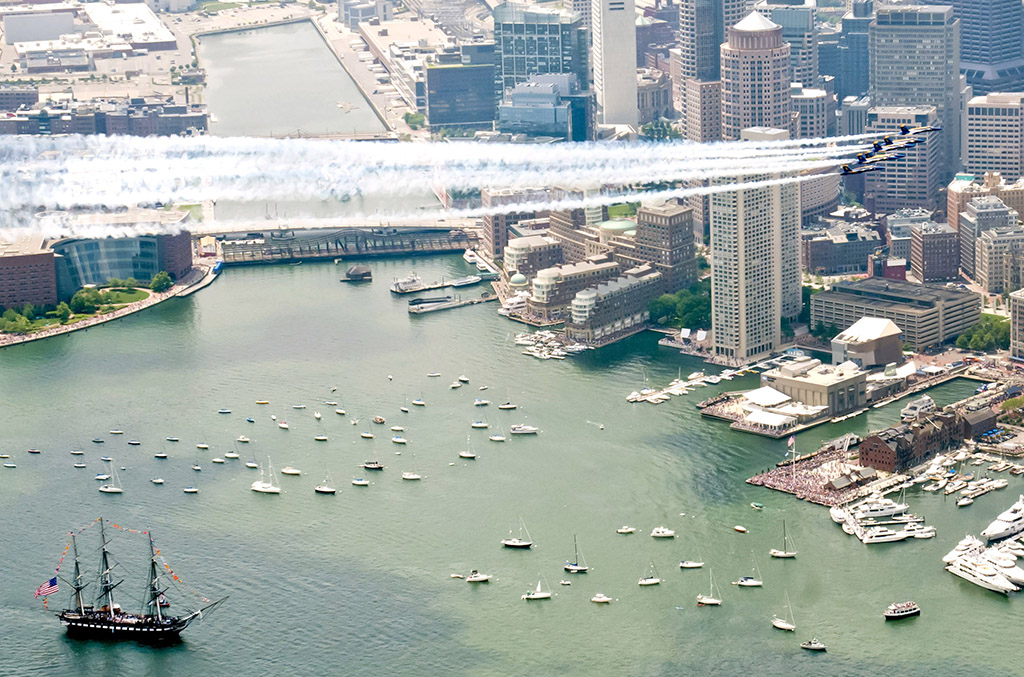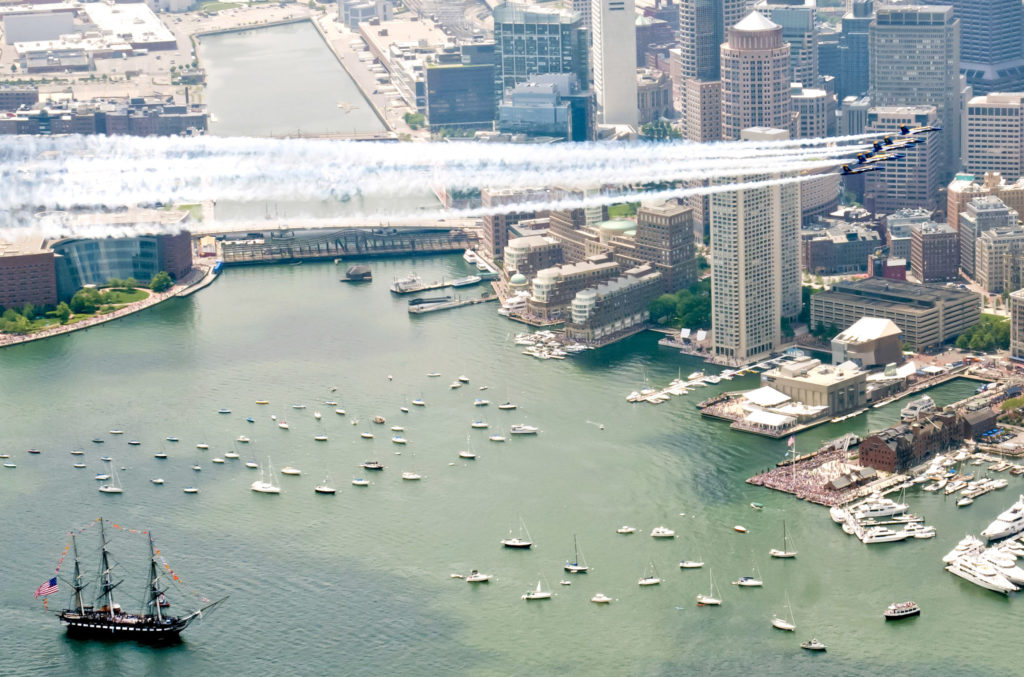
On September 1, 1812, Captain Isaac Hull stepped foot on Boston’s Long Wharf to throngs of well-wishers in celebration of USS Constitution‘s August 19th victory over HMS Guerriere.
“[USS Constitution] has been a good friend to many a worthy tar and carried them through long and perilous cruises, and done more honor to herself than any other ship in the Navy.”
Pardon Mawney Whipple, 1814
When returning home after battle, the hearts of USS Constitution‘s crew must have leapt at the sight of Boston Light. During the War of 1812, they returned to Boston three times following their stunning victories over HMS Guerriere (August 19, 1812), HMS Java (December 29, 1812), and HMS Cyane and HMS Levant (February 20, 1815). Each time the citizens flooded the streets to welcome the heroes home.
Constitution‘s string of “brilliant naval victories” elated Americans. Great Britain had the most powerful and experienced navy in the world. Many assumed that the United States’ small and largely untested navy would be no match against this formidable foe. Constitution‘s undefeated record proved that the Royal Navy could be beaten, and burnished the United States’ reputation as a naval power. “It is not merely that an English frigate has been taken after, what we are free to confess, may be called a brave resistance,” reported The Times of London about Constitution‘s victory over Guerriere, “but that it has been taken by a new enemy, an enemy unaccustomed to such triumphs, and likely to be rendered insolent and confident by them … Never before in the history of the war did an English frigate strike to an American.” The euphoria surrounding the ship’s victories and the men who won them took many forms and spread throughout the United States, even winning the hearts of those ardently opposed to the War of 1812.
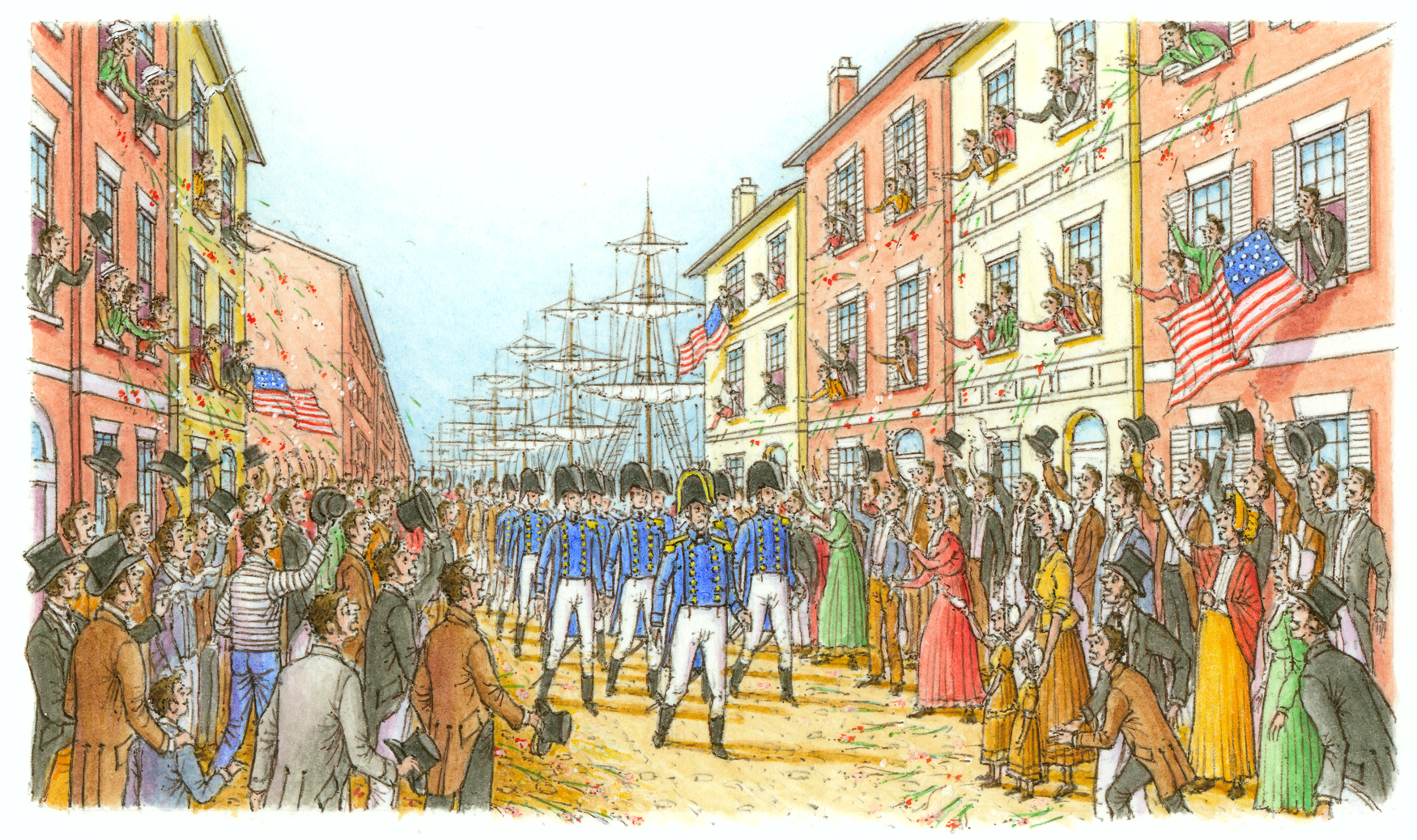
Though Constitution belonged to the American nation, Boston was her home port. Bostonians felt a special affinity for the ship and crew that they expressed upon her three victorious homecomings. As one newspaper explained, Bostonians welcomed the ship home “as a darling child.” [Salem Gazette, 30 May 1815] Not only did the public laud the ship, they also celebrated the gallantry and bravery of her captains, officers, and crew.
In his memoirs, Seaman Moses Smith recounted the festive atmosphere pervading Boston after the ship’s victory over Guerriere. Constitution anchored off Boston’s Long Wharf, the most important spot on the waterfront.
Citizens “crowded in thousands on the docks, and sent an earnest invitation for Captain [Isaac] Hull to come ashore … When he landed, the piers were crowded with people–so that he had barely room to plant his feet on the stone, as he left the boat.”
Seaman Moses Smith, USS Constitution, 1812
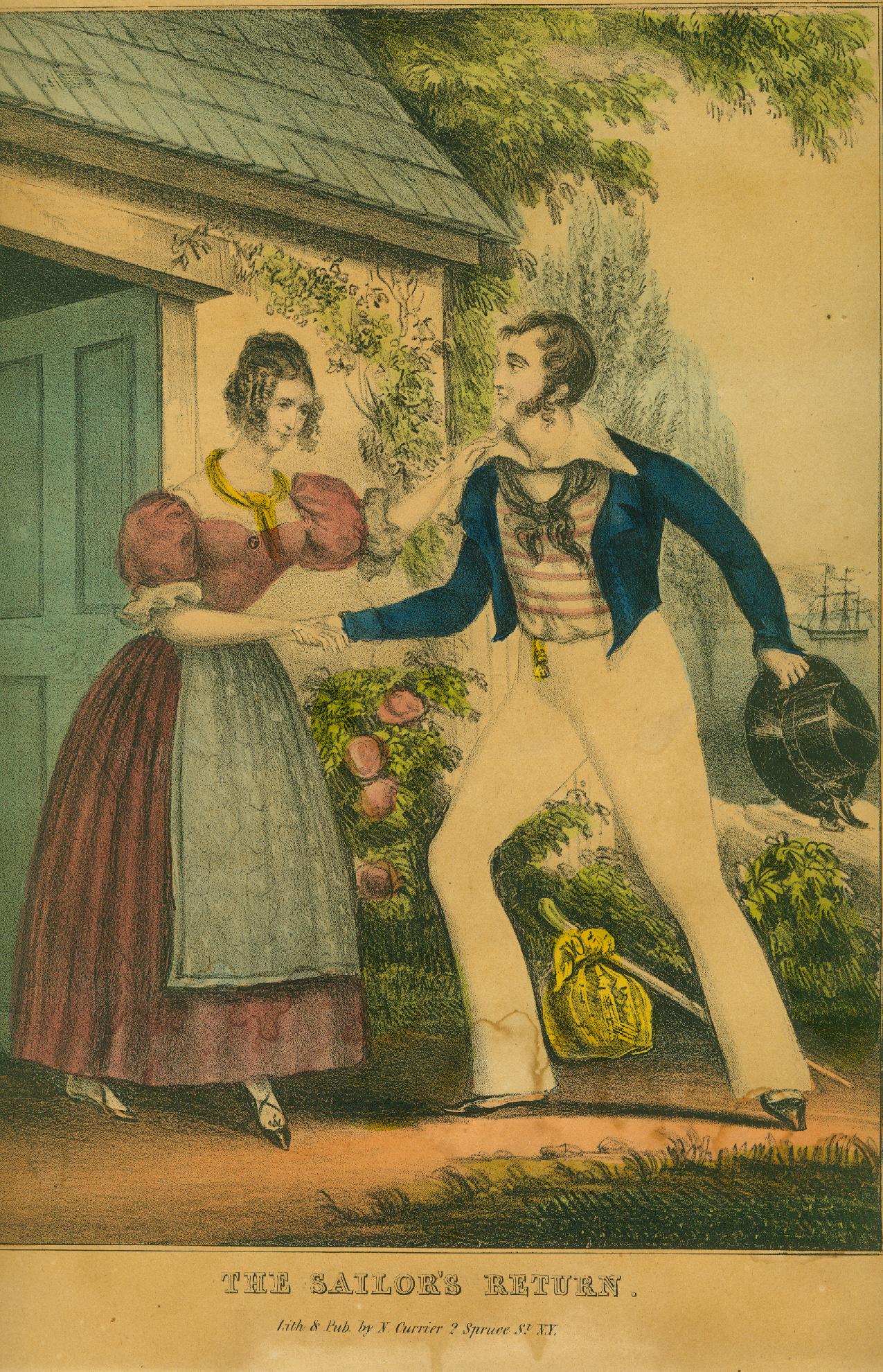
Amid this tumult, an artillery company fired a 17-gun “Federal Salute” which the ship returned. As companies of local militia units and public officials escorted Captain Hull up State Street, women leaned from the windows, waving their handkerchiefs and showering wreaths of flowers on the victor below. The procession headed for the grand Exchange Coffee House. As Hull arrived, “an immense assemblage of citizens made the air ring with loud and unanimous huzzas.” [City Gazette, 3 September 1812]
The celebration did not end with the landing parade. Four days after Hull’s arrival, hundreds of Boston’s most prominent citizens feted him and his officers at a public dinner at Faneuil Hall “as additional evidence of their sense of the gallantry and skill displayed.” Constitution‘s surgeon, Amos Evans, wrote of his “superb dinner” attended by 500 people. He admired “a model of the Constitution Frigate with her masts fished and the Colours as they flew during the action” positioned in the gallery. [Amos Evans, Journal Kept on Board the Frigate Constitution; reprint by William D. Sawtell, 1967]
The participants sang an ode specially written for the event by Lucius Manlius Sargent. The song began with an exaltation of America’s new-found naval prowess:
That warrior’s [Guerriere‘s] fight is o’er!
Still they ride, side by side,
While Columbia’s thunders roar,
While her cannon’s fire is flashing fast,
And her Yankee thunders roar.
[Lucius Manlius Sargent, “Ode. Written to be Sung at the Dinner, Given to the Officers of the … Frigate, Constitution,” Shaw & Shoemaker 26695]
A local publisher subsequently printed the song as a broadside for mass consumption. Many other broadside songs followed, including two written by Constitution‘s own boatswain’s mate, James Campbell.
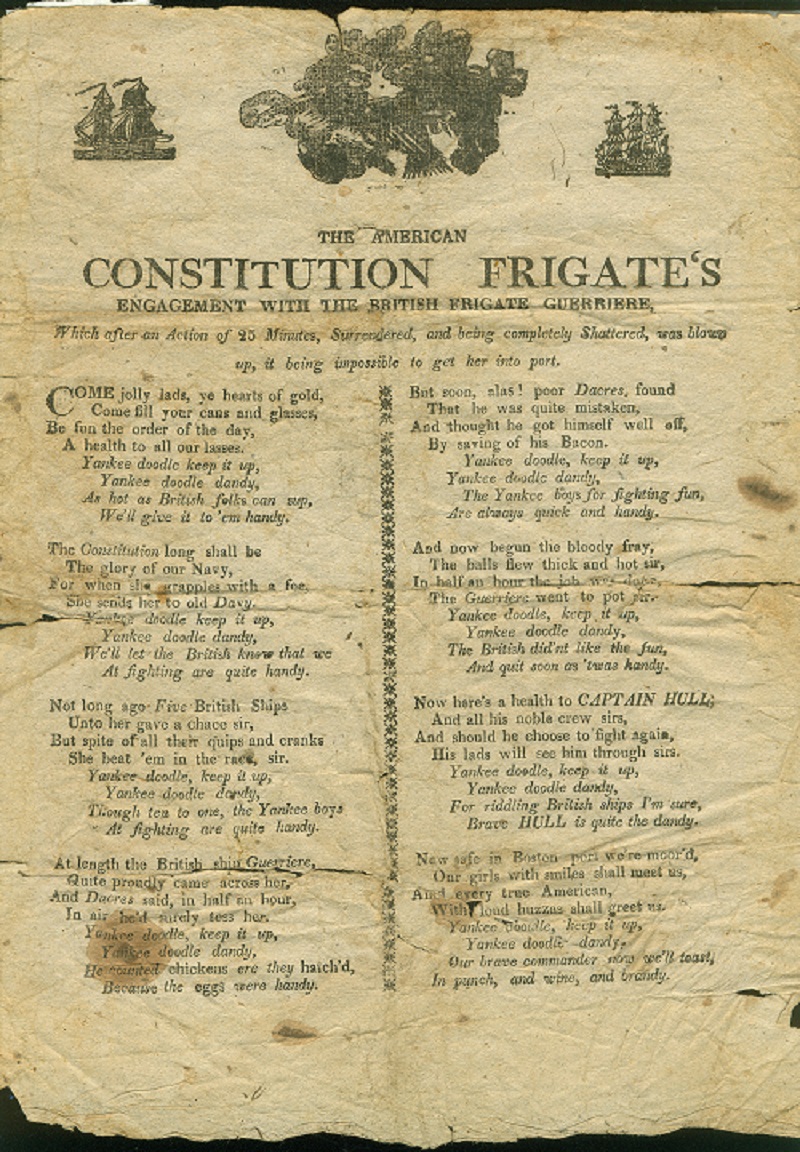
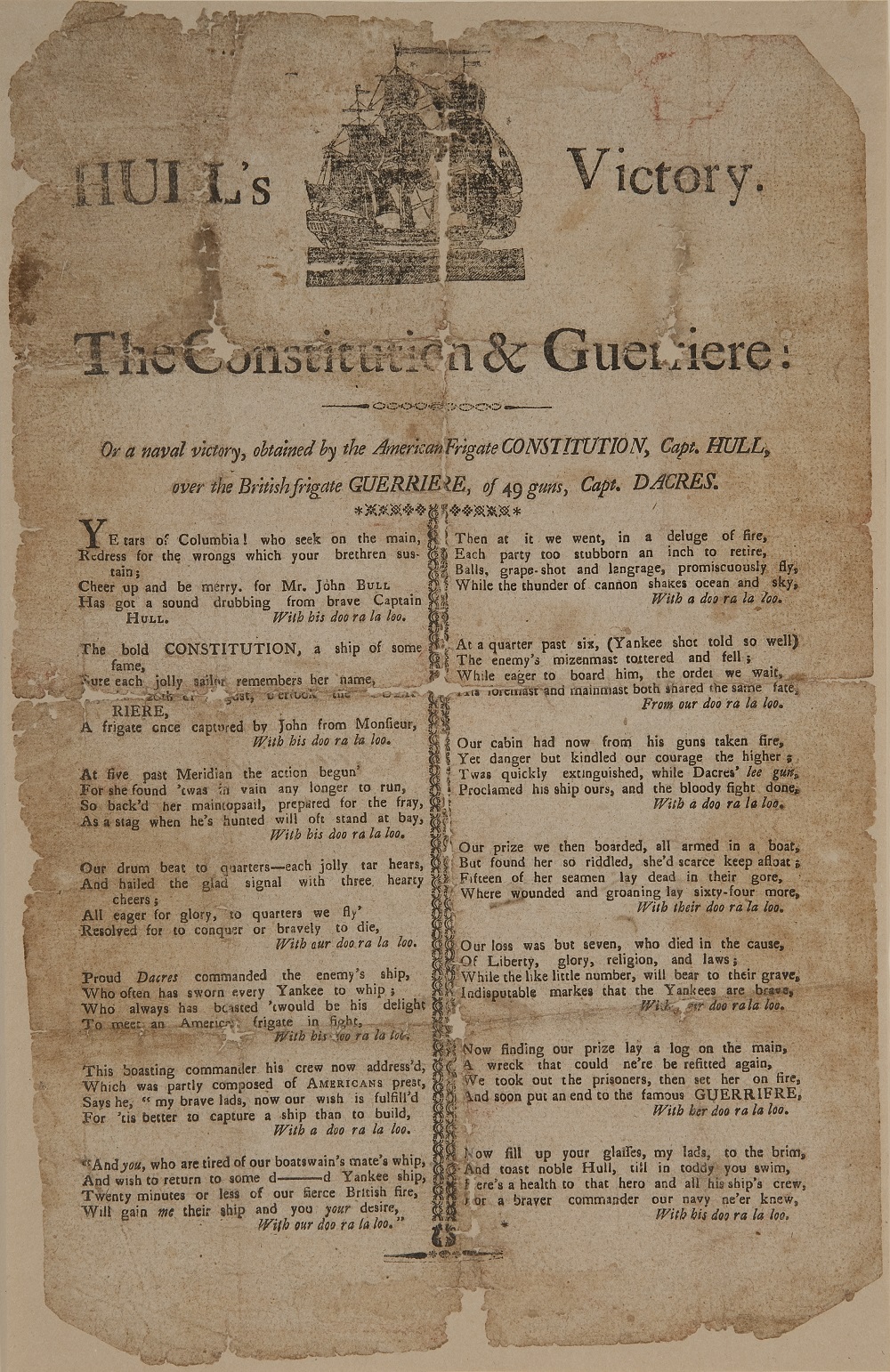
A few months after the Boston celebrations approximately 450 New York City “gentlemen” gathered at the City Hotel to celebrate Constitution and two other victorious American ships, USS United States and USS Wasp. The caterer covered the dinner table with “every dainty the season affords … succeeded by a desert [sic] consisting of delicacies of every description …, [and] the best of liquors and the choicest wines were not wanting to complete the whole.” [“Naval Dinner,” The Shamrock, or Hibernian Chronicle, 2 January 1813]
The banquet paled beside the decorations: “On entrance, the room presented the appearance of a marine palace, colonaded [sic] round with the masts of ships, entwined with laurel, and bearing the national flags of all the world–Every table had upon it a ship in miniature, with the American flag displayed.” There was also a “real lake of water, in which floated a miniature frigate.” Behind the lake hung a mainsail with federal eagle painted “in opaque, holding a scroll in his beak on which was inscribed these words ‘Our Children are the property of our Country.'” [Ibid.]
During the celebration, citizens presented thirteen formal toasts and songs, including several to Captain Hull and his “brave tars,” followed by over twenty spontaneous toasts by officers present. [Ibid.] America was enthralled by its naval officers, its ships, and their victories.
The information in this blog post is excerpted from Chapter 5 of Men of Iron: USS Constitution’s War of 1812 Crew, by Matthew Brenckle, Lauren McCormack, and Sarah Watkins, a publication by the USS Constitution Museum.
The Author(s)
Carl Herzog
Public Historian, USS Constitution Museum
Carl Herzog is the Public Historian at the USS Constitution Museum.
